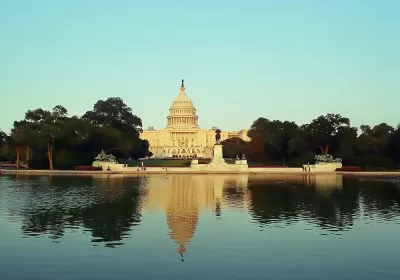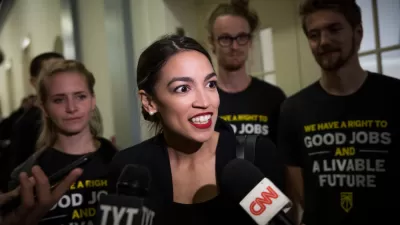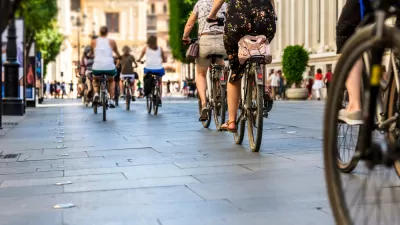Not one Democratic senator, including sponsor Ed Markey (Mass.), voted on Tuesday to support the resolution "recognizing the duty of the Federal Government to create a Green New Deal." Instead, most, but not all, Democrats voted "present."

The sweeping Senate joint resolution, S.J. Res. 8, also addresses social goals such as ensuring high-quality health care and "guaranteeing a job with a family-sustaining wage" in addition to climate change goals such as achieving "net-zero greenhouse gas emissions through a fair and just transition for all communities and workers."
Voting "present" is considered to be a "rare step," enabling Democrats "to avoid an intraparty fight on the issue," write Washington Post reporters Dino Grandoni Felicia Sonmez in an analysis of the politically-driven vote orchestrated by Senate Majority Leader Mitch McConnell (R-Ky.), "who called the plan a 'far-left wish list.'”
Nonetheless, three Democrats, Sens. Doug Jones (Ala.), Joe Manchin III (W.Va.) and Kyrsten Sinema (Ariz.), as well as Sen. Angus King (Maine), an independent who caucuses with Democrats, joined with Republicans to oppose the resolution.
Taking a swipe at both the Green New Deal and the Majority Leader, King wrote:
"I am frustrated and dispirited that the Senate Majority Leader’s first vote on climate change mitigation isn’t a serious attempt to solve the problem facing our future generations, but rather a cynical act of political theater that did not include hearings or an amendment process to provide the opportunity to improve this flawed resolution."
Joining Senator Edward J. Markey (D-Mass) in co-sponsoring the actual Green New Deal resolution in the Senate, S.Res. 59, are the six declared Democratic presidential candidates who are U.S. Senators, all of whom voted "present:" Bernie Sanders (I-Vermont), Kirsten Gillibrand (N.Y), Kamala Harris, Elizabeth Warren (Mass.), Cory Booker (N.J.), and Amy Klobuchar (Minn.). [McConnell sponsored the joint resolution which was voted on Tuesday.]
The reporters discuss the candidates' positions on the Green New Deal delivered at a press event on Tuesday in front of the Capitol.
"One irony of the Green New Deal proposal is that it is forcing some Republicans to put forward their own climate proposals after being led for two years by Trump, who has repeatedly dismissed the overwhelming consensus among climate scientists that humans are warming the world," write Grandoni and Sonmez in the final paragraph.
Related in Planetizen:
-
Climate Action and the Green New Deal: Interview with Rep. Mike Levin, February 28, 2019
-
Updated: What the Green New Deal Means for Planning, February 11, 2019
-
Green New Deal Resolution Introduced in Congress, February 8, 2019
Hat tip to Kelsey Tamborrino, POLITICO Morning Energy.
FULL STORY: Senate defeats Green New Deal, as Democrats call vote a ‘sham’

Planetizen Federal Action Tracker
A weekly monitor of how Trump’s orders and actions are impacting planners and planning in America.

Chicago’s Ghost Rails
Just beneath the surface of the modern city lie the remnants of its expansive early 20th-century streetcar system.

San Antonio and Austin are Fusing Into one Massive Megaregion
The region spanning the two central Texas cities is growing fast, posing challenges for local infrastructure and water supplies.

Since Zion's Shuttles Went Electric “The Smog is Gone”
Visitors to Zion National Park can enjoy the canyon via the nation’s first fully electric park shuttle system.

Trump Distributing DOT Safety Funds at 1/10 Rate of Biden
Funds for Safe Streets and other transportation safety and equity programs are being held up by administrative reviews and conflicts with the Trump administration’s priorities.

German Cities Subsidize Taxis for Women Amid Wave of Violence
Free or low-cost taxi rides can help women navigate cities more safely, but critics say the programs don't address the root causes of violence against women.
Urban Design for Planners 1: Software Tools
This six-course series explores essential urban design concepts using open source software and equips planners with the tools they need to participate fully in the urban design process.
Planning for Universal Design
Learn the tools for implementing Universal Design in planning regulations.
planning NEXT
Appalachian Highlands Housing Partners
Mpact (founded as Rail~Volution)
City of Camden Redevelopment Agency
City of Astoria
City of Portland
City of Laramie





























